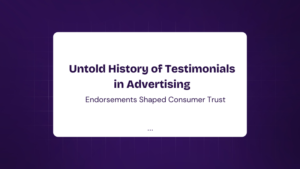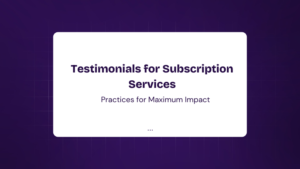Craft a Testimonial That Speaks Volumes—Not Just Fills Space!
Ever found yourself staring at a blank screen, trying to write a testimonial for an event you genuinely enjoyed, only to realize you sound like a robot? “The event was great. I had fun. Highly recommended.” Yawn. 🥱
Let’s face it—most testimonials are dull, vague, and forgettable. But what if I told you that your testimonial could actually matter? That it could make someone excited to attend the next event, help organizers improve, and maybe even get you a shoutout?
Buckle up, because I’m about to show you how to write a testimonial that grabs attention, tells a compelling story, and makes people wish they were there.
Why Testimonials Matter for Events
Think of testimonials as the modern-day version of word-of-mouth marketing. According to BrightLocal, 91% of people trust online reviews as much as personal recommendations. Whether it’s a corporate seminar, a music festival, or a charity gala, testimonials help:
✅ Boost credibility – People trust real experiences more than event descriptions.
✅ Encourage attendance – A glowing testimonial can be the final nudge someone needs.
✅ Provide constructive feedback – Your words can help organizers improve.
Now that we’ve established why testimonials matter, let’s get into how to write one that isn’t as lifeless as an elevator pitch.
Set the Scene (Hook Your Reader in the First Sentence!)
Boring: “I attended the XYZ conference, and it was good.”
Better: “I walked into the XYZ Conference expecting another run-of-the-mill business event, but within 10 minutes, I was already jotting down ideas that would change my career.”
Your testimonial should start with a hook—something that immediately paints a picture and makes readers feel your experience. Think about what stood out to you the most and lead with that.
💡 Pro Tip: If possible, mention an emotion. Did the event inspire you? Surprise you? Leave you speechless?
Talk About the Experience (Details Matter!)
Now that you’ve hooked your reader, it’s time to share the why.
Ask yourself:
✔️ What was unique about this event?
✔️ How was it different from others you’ve attended?
✔️ What specific elements did you love? (Speakers, networking, venue, activities?)
📌 Example:
“Unlike most conferences where speakers just recite slides, this one felt like a TED Talk lineup. Every session had engaging discussions, and I walked away with actionable insights instead of just a pile of notes I’ll never read again.”
💡 Pro Tip: Specificity makes a testimonial powerful. Instead of saying, “The speakers were great,” mention a specific speaker and what they said that impacted you.
Share the Impact (Why Does It Matter?)
A great testimonial isn’t just about what happened—it’s about what changed because of the event.
✔️ Did you learn something valuable?
✔️ Did you make connections that led to opportunities?
✔️ Did the event inspire you to take action?
📌 Example:
“Attending the XYZ Summit didn’t just give me industry insights—it landed me a job offer! One of the panel discussions led me to chat with a recruiter, and two weeks later, I started a new role. This event was a game-changer for me.”
See the difference? Testimonials that showcase real impact carry more weight than generic praise.
Add a Personal Touch (Make It Relatable!)
Don’t be afraid to make your testimonial sound like you. If the event was fun, let your enthusiasm shine. If it was thought-provoking, let that come through.
📌 Example:
“I went in expecting another dry corporate event, but by the end of the day, I was exchanging LinkedIn connections like a pro and even ended up on stage during a panel Q&A. Who knew networking could actually be fun?”
People connect with authenticity. Let your personality show!
Wrap It Up with a Strong Recommendation
End your testimonial by making it clear why others should attend. You can do this in a few ways:
✔️ Direct Recommendation: “If you’re in [industry], this event is a must-attend.”
✔️ FOMO (Fear of Missing Out): “Trust me, you don’t want to miss the next one.”
✔️ Comparison: “I’ve attended a lot of events, but this one set the gold standard.”
📌 Example:
“If you’re even remotely considering attending next year’s XYZ Event, stop thinking and book your ticket. It’s worth every penny, and I’ll definitely be back!”
A Real-Life Example of a Powerful Event Testimonial
Still not sure how it’s done? Here’s a real example from TEDx attendees:
“I came to TEDx expecting to be inspired, but I left transformed. Every speaker challenged my way of thinking, and by the end of the day, I had a list of ideas I couldn’t wait to act on. This event is a must for anyone who wants to think bigger and do better.”
Notice how it:
✔ Hooks the reader (came expecting, left transformed)
✔ Mentions the experience (every speaker challenged my thinking)
✔ Shows the impact (left with ideas to act on)
✔ Ends with a strong recommendation (a must for anyone who wants to think bigger and do better)
This is what makes a testimonial powerful!
FAQs
How long should my testimonial be?
It depends, but aim for 3-5 sentences minimum. Anything shorter might seem insincere, while anything too long might lose readers.
Can I be critical in my testimonial?
Yes! Constructive feedback can be valuable. Just make sure to balance it with positives. Example: “While I loved the keynote speaker, I wish there had been more networking opportunities.”
Should I include my name and job title?
If possible, yes! Testimonials with real names and credentials (e.g., “John Doe, Marketing Manager at XYZ Corp.”) appear more credible than anonymous ones.
Can I add humor to my testimonial?
Absolutely! If the event was lighthearted, humor can make your testimonial more engaging. Just make sure it aligns with the event’s tone.
Where will my testimonial be used?
Usually, event organizers use testimonials on their websites, social media, or promotional materials. If you have privacy concerns, you can ask for anonymity.
Final Thoughts: Your Testimonial Can Make a Difference
A great testimonial does more than just say, “I liked it.” It tells a story, creates excitement, and helps future attendees decide whether the event is worth it.
So next time you’re asked to write one, don’t settle for something generic. Instead, craft a testimonial that stands out, feels personal, and actually makes an impact.
Who knows? You might just see your words featured on the event’s homepage. 😉



